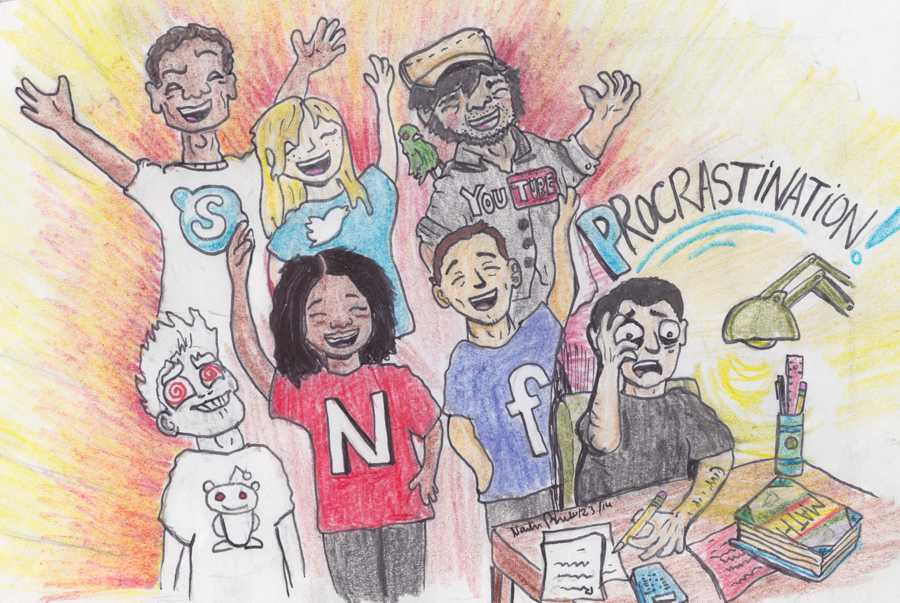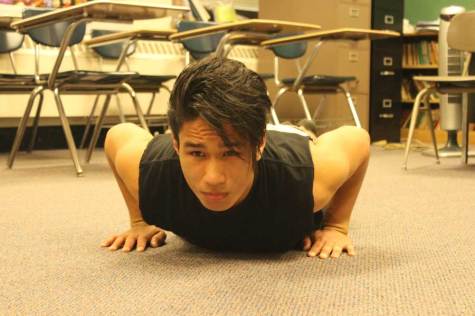Teenagers wrestle with procrastination
I’ll do it later.
Even if you believe you work better under pressure, you won’t do as well if you procrastinate, and you run the risk of not turning work in at all.
High school students always seem to be buried in work and can feel like the best solution is to put it off and focus on sleeping or taking time for themselves. Of course, it’s necessary to do that, but wasting time is unhealthy.
“I think with so many things competing, it’s hard to know what needs to be done in what order,” says History teacher Betsy Gutstein. It is very true that high school students have many projects and assignments piled up at all times–it’s very rare that one would go home with no homework to do. And when you’re also in sports or other after school activities, it can be even harder to think about managing time.
“The thing about procrastination is that the longer you put something off, the harder your life becomes,” says senior Bella Thoren. “When things start to pile up, it can become really hard to see over all the work you still have to do.”
The reason so many people seem to procrastinate, according to Time magazine, is that procrastination may be in your genes. It’s something that has been passed down, mostly through more recent generations given our development in technology and our shortening attention spans. Now as a society, we tend to focus on more long-term goals.
“I think it’s really easy for things to build up. There are so many things that can distract us, and we have such short attention spans that it’s hard to focus on things for a long time,” says sophomore Graham Byrne.
This buildup of assignments ends up adding a lot of stress to student’s routines, which leads to sleepless nights and increased tiredness during classes. This buildup can also be due to impulsivity. This means that you see something else worth doing and decide to do that before accomplishing what you actually need to, which leads to procrastination.
“My work has definitely been affected by procrastination,” says sophomore Mae Hurtig. “It’s best not to procrastinate because the sooner you do your work, the sooner you can do what you want and feel accomplished.” Achieving the work you were supposed to do produces a great feeling and a sense of relaxation.
The main thing we as students need in order to change our study habits is will power. If a student has enough will power and thinks about how procrastination is going to negatively affect them, then they will realize that they have to buckle down and get to work.
So how do you deal with procrastination? Well, according to Time, it’s not as hard as you might think, even if it is in your genes. One way to prevent yourself from putting down your work is to think about your future self. Think about what your “tomorrow self” would say to your “right now self.” If you procrastinated, it may be along the lines of, “I’m so tired, I wish I had started working on my homework earlier,” or maybe “I wish I had finished that in time to turn it in so my grade would stay up.”
“If someone wants to stop procrastinating, they have to decide they really want to turn around. We have good habits and bad habits, but when you recognize that you can benefit from making a change, that’s a good motive,” says Gutstein.
If you feel like you’re a “chronic” procrastinator, all you have to do is asses your situation and find things that will make it easier for you to sit down, focus, and do all the work you need to do, even if it’s tiresome. Finish what needs to get done, and you’ll find yourself with much more time to relax and do what you want to do.
Your donation will support the student journalists of the Evanstonian. We are planning a big trip to the Journalism Educators Association conference in Nashville in November 2025, and any support will go towards making that trip a reality. Contributions will appear as a charge from SNOSite. Donations are NOT tax-deductible.







